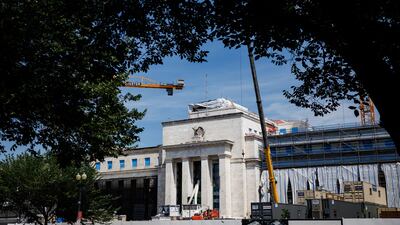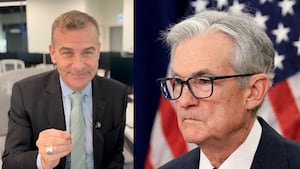Replacing Federal Reserve Chair Jerome Powell is not a question of if, but when.
Speculation over who could succeed Mr Powell ramped up this week following reports that President Donald Trump was considering firing the Fed chair – an unprecedented action.
Mr Powell's term expires in May 2026. Mr Trump said it was unlikely he will try to fire Mr Powell and will instead wait out the remainder of his term.
The US President has thus far not attempted to oust Mr Powell, but the race to replace him has already begun. He has considered naming Mr Powell's successor by September or even sooner, the Wall Street Journal reported last month.
Such an extended period could lead to confusion in the markets should a “shadow Fed chair” emerge ahead of the end of Mr Powell's term. But Mr Trump has become increasingly irate with Mr Powell for not cutting interest rates.
Mr Trump has made clear that anyone who wants the job in Foggy Bottom must support low interest rates.
Here is a look at the reported candidates to replace Mr Powell:
Kevin Hassett
National Economic Council Kevin Hassett is one of Mr Trump's longest-serving economic aides. Mr Hassett held two roles during Mr Trump's first term including as chair of the Council of Economic Advisors.
He was also the economic architect of the Abraham Accords.
Before rejoining the White House this year, Mr Hassett was the global director of research for Affinity Partners, a private equity firm led by Jared Kushner, Mr Trump's son-in-law.
He was previously director of economic policy studies at the conservative think tank American Enterprise Institute. Mr Hassett also served as economic adviser to John McCain, George Bush and Mitt Romney during their presidential campaigns.
Kevin Warsh
Former Federal Reserve governor Kevin Warsh served as former Fed chair Ben Bernanke's liaison between Washington and Wall Street during the global financial crisis.
Mr Warsh has become increasingly critical about the Powell Fed within the last year, accusing the current board of “mission creep” earlier in May.
Speaking to CNBC on Thursday, the former Fed governor criticised the central bank for worrying that Mr Trump's tariffs policies could lead to an inflation resurgence.
“If they were a very credible central bank, they could say, ‘We’re looking past this one-off change in prices,’ and so their hesitancy to cut rates, I think, is actually quite a mark against them,” he said.
Mr Warsh was considered a hawkish official to fight against inflation during his tenure at the Fed from 2006 to 2011, but he has shifted his position this year which has put him in line with Mr Trump's desire install a dove to lead the Fed.
Scott Bessent
Treasury Secretary Scott Bessent, who is leading the search committee, is also a reported contender.
Mr Bessent has been at the centre of tariff negotiations with major trading partners including China.
But Mr Trump could want Mr Bessent to remain at the Treasury Department.
“Because I like the job he’s doing,” Mr Trump said on Tuesday.
Christopher Waller
Christopher Waller, who currently serves on the Federal Reserve Board of Governors, is considered to be a dark horse candidate to ascend to chair.
Mr Waller is notably one of two Fed officials to argue for a rate cut at the Fed's next meeting. On Thursday he remade the case to cut by 25 basis points during a speech in New York titled, The Case for Cutting Now.
"Standard central banking practice is to 'look through' such price-level effects as long as inflation expectations are anchored, which they are," he said at the Money Marketers of New York University.
Mr Waller also said underlying jobs data showed that the labour market is not as strong as it appears to be. He added that he would support an additional rate cut later this year and suggest the current target range is roughly 1.25 to 1.50 percentage points above the "neutral rate".
Mr Waller, a Trump appointee, joined the Fed in 2020. His tenure as Fed governor runs through January 2030.
UAE currency: the story behind the money in your pockets
Other acts on the Jazz Garden bill
Sharrie Williams
The American singer is hugely respected in blues circles due to her passionate vocals and songwriting. Born and raised in Michigan, Williams began recording and touring as a teenage gospel singer. Her career took off with the blues band The Wiseguys. Such was the acclaim of their live shows that they toured throughout Europe and in Africa. As a solo artist, Williams has also collaborated with the likes of the late Dizzy Gillespie, Van Morrison and Mavis Staples.
Lin Rountree
An accomplished smooth jazz artist who blends his chilled approach with R‘n’B. Trained at the Duke Ellington School of the Arts in Washington, DC, Rountree formed his own band in 2004. He has also recorded with the likes of Kem, Dwele and Conya Doss. He comes to Dubai on the back of his new single Pass The Groove, from his forthcoming 2018 album Stronger Still, which may follow his five previous solo albums in cracking the top 10 of the US jazz charts.
Anita Williams
Dubai-based singer Anita Williams will open the night with a set of covers and swing, jazz and blues standards that made her an in-demand singer across the emirate. The Irish singer has been performing in Dubai since 2008 at venues such as MusicHall and Voda Bar. Her Jazz Garden appearance is career highlight as she will use the event to perform the original song Big Blue Eyes, the single from her debut solo album, due for release soon.
RESULTS
%3Cp%3E%3Cstrong%3E5pm%3C%2Fstrong%3E%20Al%20Shamkha%20%E2%80%93%20Maiden%20(PA)%20Dh80%2C000%20(Turf)%201%2C400m%3Cbr%3E%3Cstrong%3EWinner%3C%2Fstrong%3E%20Ruwani%2C%20Moatasem%20Al%20Balushi%20(jockey)%2C%20Abdallah%20Al%20Hammadi%20(trainer)%3Cbr%3E%3Cstrong%3E5.30pm%3C%2Fstrong%3E%3A%20Khalifa%20City%20%E2%80%93%20Handicap%20(PA)%20Dh80%2C000%20(T)%201%2C400m%3Cbr%3E%3Cstrong%3EWinner%20%3C%2Fstrong%3EAF%20Heraqle%2C%20Bernardo%20Pinheiro%2C%20Qaiss%20Aboud%3Cbr%3E%3Cstrong%3E6pm%3C%2Fstrong%3E%20Masdar%20City%20%E2%80%93%20Handicap%20(PA)%20Dh80%2C000%20(T)%201%2C600m%3Cbr%3E%3Cstrong%3EWinner%3C%2Fstrong%3E%20AF%20Yatwy%2C%20Patrick%20Cosgrave%2C%20Nisren%20Mahgoub%3Cbr%3E%3Cstrong%3E6.30pm%3C%2Fstrong%3E%20Wathba%20Stallions%20Cup%20%E2%80%93%20Handicap%20(PA)%20Dh70%2C000%20(T)%202%2C200m%3Cbr%3E%3Cstrong%3EWinner%3C%2Fstrong%3E%20AF%20Alzahi%2C%20Tadhg%20O%E2%80%99Shea%2C%20Ernst%20Oertel%3Cbr%3E%3Cstrong%3E7pm%3C%2Fstrong%3E%20Emirates%20Championship%20%E2%80%93%20Group%201%20(PA)%20Dh1%2C000%2C000%20(T)%202%2C200m%3Cbr%3E%3Cstrong%3EWinner%3C%2Fstrong%3E%20Ajrad%20Athbah%2C%20Bernardo%20Pinheiro%2C%20Majed%20Al%20Jahouri%3Cbr%3E%3Cstrong%3E7.30pm%3C%2Fstrong%3E%20Shakbout%20City%20%E2%80%93%20Handicap%20(TB)%20Dh80%2C000%20(T)%202%2C400m%3Cbr%3E%3Cstrong%3EWinner%3C%2Fstrong%3E%20Webinar%2C%20Tadhg%20O%E2%80%99Shea%2C%20Bhupat%20Seemar%3C%2Fp%3E%0A
How%20champions%20are%20made
%3Cp%3E%0D%3Cstrong%3EDiet%3C%2Fstrong%3E%20%0D%3Cbr%3E7am%20-%20Protein%20shake%20with%20oats%20and%20fruits%0D%3Cbr%3E10am%20-%205-6%20egg%20whites%0D%3Cbr%3E1pm%20-%20White%20rice%20or%20chapati%20(Indian%20bread)%20with%20chicken%0D%3Cbr%3E4pm%20-%20Dry%20fruits%20%0D%3Cbr%3E7.30pm%20-%20Pre%20workout%20meal%20%E2%80%93%20grilled%20fish%20or%20chicken%20with%20veggies%20and%20fruits%0D%3Cbr%3E8.30pm%20to%20midnight%20workout%0D%3Cbr%3E12.30am%20%E2%80%93%20Protein%20shake%20%0D%3Cbr%3E%3Cstrong%3ETotal%20intake%3A%3C%2Fstrong%3E%204000-4500%20calories%20%0D%3Cbr%3E%3Cstrong%3ESaidu%E2%80%99s%20weight%3A%3C%2Fstrong%3E%20110%20kg%0D%3Cbr%3E%3Cstrong%3EStats%3A%3C%2Fstrong%3E%20Biceps%2019%20inches.%20Forearms%2018%20inches%3C%2Fp%3E%0A
Results:
First Test: New Zealand 30 British & Irish Lions 15
Second Test: New Zealand 21 British & Irish Lions 24
Third Test: New Zealand 15 British & Irish Lions 15
SPECS
%3Cp%3E%3Cstrong%3EEngine%3C%2Fstrong%3E%3A%202-litre%20direct%20injection%20turbo%20%0D%3Cbr%3E%3Cstrong%3ETransmission%3C%2Fstrong%3E%3A%207-speed%20automatic%20%0D%3Cbr%3E%3Cstrong%3EPower%3C%2Fstrong%3E%3A%20261hp%20%0D%3Cbr%3E%3Cstrong%3ETorque%3C%2Fstrong%3E%3A%20400Nm%20%0D%3Cbr%3E%3Cstrong%3EPrice%3C%2Fstrong%3E%3A%20From%20Dh134%2C999%26nbsp%3B%3C%2Fp%3E%0A
Dhadak 2
Director: Shazia Iqbal
Starring: Siddhant Chaturvedi, Triptii Dimri
Rating: 1/5
David Haye record
Total fights: 32
Wins: 28
Wins by KO: 26
Losses: 4
UAE squad
Esha Oza (captain), Al Maseera Jahangir, Emily Thomas, Heena Hotchandani, Indhuja Nandakumar, Katie Thompson, Lavanya Keny, Mehak Thakur, Michelle Botha, Rinitha Rajith, Samaira Dharnidharka, Siya Gokhale, Sashikala Silva, Suraksha Kotte, Theertha Satish (wicketkeeper) Udeni Kuruppuarachchige, Vaishnave Mahesh.
UAE tour of Zimbabwe
All matches in Bulawayo
Friday, Sept 26 – First ODI
Sunday, Sept 28 – Second ODI
Tuesday, Sept 30 – Third ODI
Thursday, Oct 2 – Fourth ODI
Sunday, Oct 5 – First T20I
Monday, Oct 6 – Second T20I




